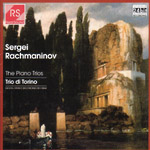Trio di Torino’s heartfelt, heart-rending rendition of Rachmaninov’s Second Piano Trio epitomizes the term “Elegiac”. Right from the gloomily portentous piano chords underlying the cello’s plangent statement of the main theme, the players faithfully evoke the music’s stirring emotional intensity, an intensity that continues unabated throughout the first movement. However, they also exhibit a refreshing lightness and a variety of tonal colors in the long theme-and-variations second movement. And they masterfully project the stormy drama of the brief finale, which ends in the first movement’s mood of despair. The recent version by the Moscow Rachmaninov Trio on Hyperion (see review Q3784) sounds emotionally reserved by comparison, even though it’s actually a finely honed, structurally taut performance.
Rachmaninov’s earlier, compact Trio No. 1 receives no less commitment from the Torino, which relishes in the composer’s bravura piano writing. The recording, made in the acoustically spacious Gustav Mahler Saal in Italy, is quite reverberant, creating an atmosphere that enhances the dynamic impact. This is a most enjoyable disc, and a must for Rachmaninov fans.
































